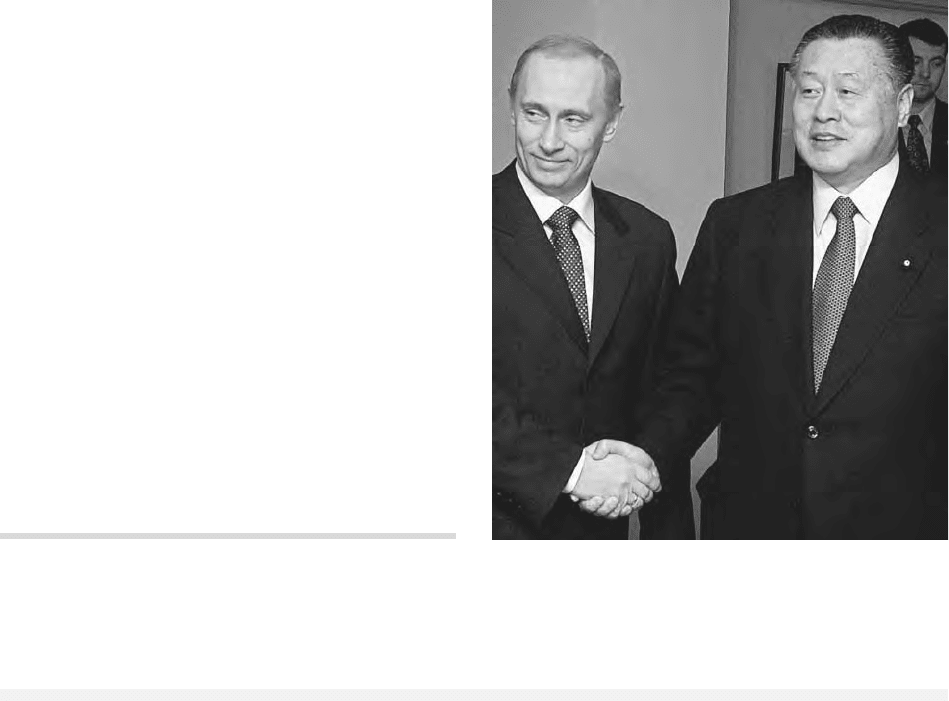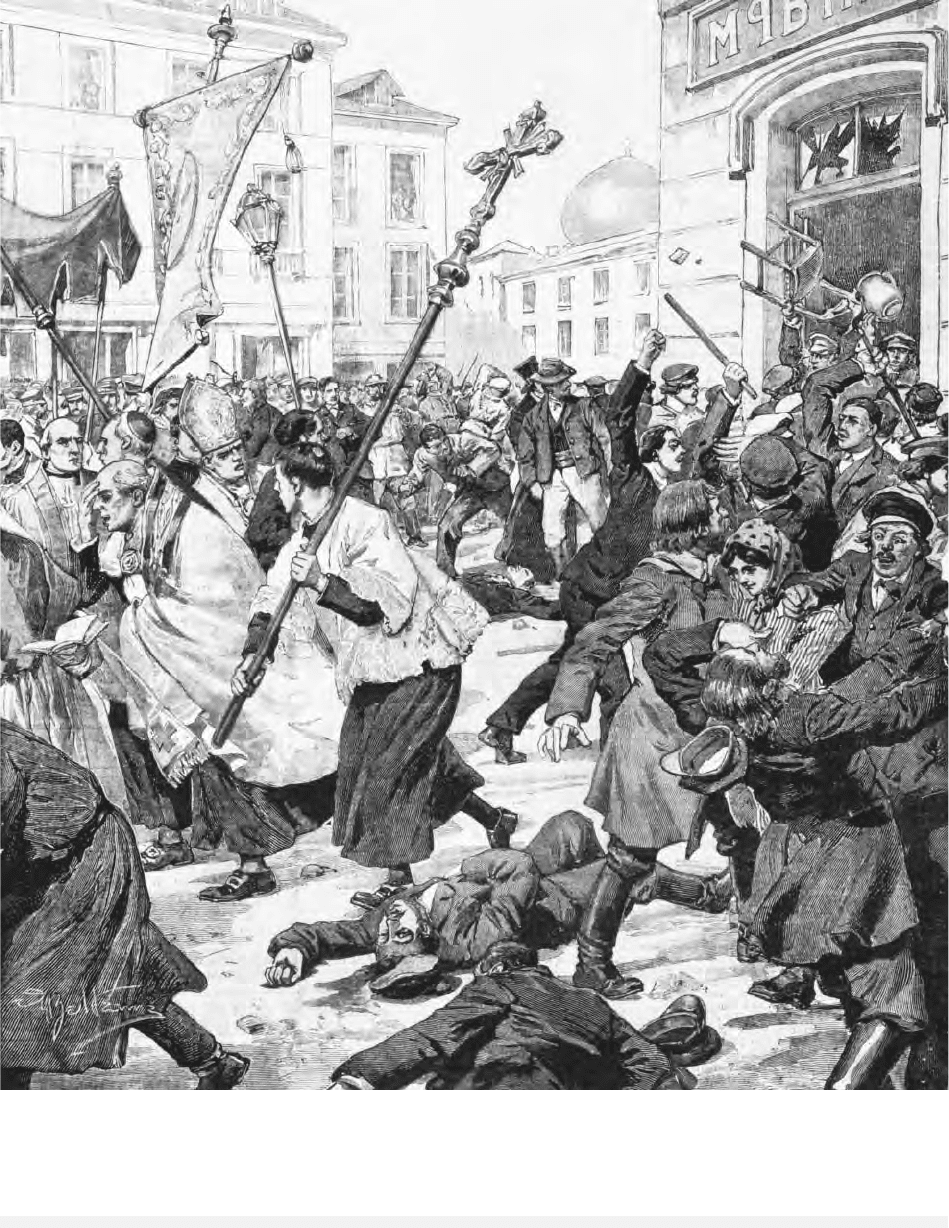Encyclopedia of Russian History
Подождите немного. Документ загружается.


Ukraine (CPU) under Volodymyr Shcherbytsky
(1918–1989). In early 1980, following the Soviet
invasion of Afghanistan, Ivashko was sent tem-
porarily to Kabul, where he played the role of ad-
visor to Soviet puppet ruler Babrak Karmal.
Subsequently, however, he remained in Ukraine.
After the resignation of Shcherbytsky in Septem-
ber 1989, Ivashko was elected first secretary of the
Central Committee (CC) of the CPU. During the
summer of 1990, he resigned suddenly after
Mikhail Gorbachev requested that he take up a
newly created position in Moscow as deputy gen-
eral secretary of the CC of the Communist Party
of the Soviet Union on July 11, 1990. At the
Twenty-Eighth Party Congress of the same month,
he defeated Yegor Ligachev in an election to take
on this role. Analysts continue to debate Ivashko’s
role in the failed putsch of August 1991 in Moscow,
in which he appeared to have adopted a middle role
between the plotters and Gorbachev.
See also: UKRAINE AND UKRAINIANS
BIBLIOGRAPHY
Kuzio, Taras. (2000). Ukraine: Perestroika to Independence.
New York: St. Martin’s Press.
Solchanyk, Roman. (2001). Ukraine and Russia: The Post-
Soviet Transition. Lanham, MD: Rowman & Little-
field.
Wilson, Andrew. (1997). Ukrainian Nationalism in the
1990s: A Minority Faith. Cambridge, UK: Cambridge
University Press.
D
AVID
R. M
ARPLES
IZBA
Izba is the Russian word for “peasant hut.”
The East Slavic (Russian, Ukrainian) izba re-
mained fundamentally unchanged as the Slavs mi-
grated into Ukraine sometime after 500 C.E., then
moved north to Novgorod and the Finnish Gulf by
the end of the ninth century, and finally migrated
east into the Volga-Oka mesopotamia between
1000 and 1300. Primarily the Slavs settled in
forested areas because predatory nomads kept them
north of the steppes. In forested regions the izba
typically was a log structure with a pitched,
thatched roof. The dimensions of the huts depended
on the height of the trees out of which they were
constructed. In the few non-forested areas where
East Slavs lived prior to the construction of forti-
fied lines (especially the Belgorod Line in 1637–1653),
which walled the steppe off from areas to the north
of it, people inhabited houses constructed of staves,
wattle, and mud. From time to time people also
lived in semi-pit dwellings, dugouts in the ground
covered over with branches and other materials to
keep out the rain and snow.
The interiors of the izba were fundamentally
the same everywhere, though the precise layouts
depended on locale. In the North and in central Rus-
sia, when one entered through the door, the stove
(either immediately adjacent to the wall or with a
space between the stove and the wall) was imme-
diately to the right, and the stove’s orifice was fac-
ing the wall opposite the entrance. In southeastern
Russia the stove was along the wall opposite the
entrance, with the orifice facing the entrance. Other
variations could be found in western and south-
western Russia. Because the fundamental problem
of the izba was heating it, conservation of heat
during the six months of the heating season (pri-
marily October through March) was the major
structural issue. There were several solutions. One
was to chink the spaces between the logs with moss
and mud. The second was the so-called “Russian
stove,” typically a large, three-chambered object
made of various combinations of stone, mud, brick,
and cement. Its three chambers extracted most of
the heat before it reached the smoke hole and ra-
diated it out into the room. The third solution for
saving heat was not to have any form of chimney
(and only a few small windows), because typically
eighty percent of the heat generated by a stove or
an open hearth in the middle of the room will be
lost if there is a chimney venting the stove or a
hole in the roof to exhaust the smoke. Such a large
percentage of heat is lost because of the require-
ment of a “draw” to pull the smoke upward and
out of the izba.
The consequences of this third form of izba
heating were numerous. For one, there was soot
scattered throughout the izba, typically with a line
around the walls, about waist-high, marking
where the bottom of the smoke typically was. The
smoke had two basic harmful constituents: carbon
monoxide gas and more than two hundred vari-
eties of particulate matter. The harm this did to
peasant health and the amount by which it reduced
residents’ energy have not been calculated. Gov-
ernment officials beginning at least as early as the
reign of Nicholas I were concerned about the health
impact of the smoky hut, and by 1900 most were
gone, though some lingered on into the 1930s. That
IZBA
693
ENCYCLOPEDIA OF RUSSIAN HISTORY

peasants thereafter were able to afford the fuel to
compensate for the heat lost through chimneys in-
dicates that peasant incomes were rising.
The other features of the izba were benches
around the room, on which the peasants sat dur-
ing the day and on which many of them slept at
night. The most honored sleeping places were on
top of the stove. These places were reserved for the
old people, an especially relevant issue after the in-
troduction of the household tax in 1678, which
forced the creation of the extended Russian family
household and increased the mean household size
from four to ten. This packing of so many people
into the izba must have increased the communica-
tion of diseases significantly, another consequence
of the izba that remains to be calculated.
The Russian word for “table” (stol) is old, go-
ing back to Common Slavic, whereas the word for
chair (stul) only dates from the sixteenth century.
These facts correspond with historians’ general un-
derstandings: most peasant izby had tables, but
many probably did not have chairs. Ceilings were
introduced in some huts around 1800, pushing the
smoke all the way down to the floor. Before 1800
the huts all had pitched roofs and the smoke would
rise up under the roof and fill the space from the
underside of the roof down to where the smoke line
was. With the introduction of the ceiling, that cav-
ity was lost and the smoke went down to the floor.
Goods were stored in trunks.
See also: PEASANTRY; SERFDOM
BIBLIOGRAPHY
Hellie, Richard. (2001). “The Russian Smoky Hut and Its
Probable Health Consequences.” Russian History
28(1–4):171–184.
R
ICHARD
H
ELLIE
IZVESTIYA
The newspaper Izvestiya was first published on Feb-
ruary 28, 1917, by the Petrograd Soviet of Work-
ers and Soldiers’ Deputies formed during the
February Revolution. The paper’s name in Russian
means “Bulletin,” and it first appeared under the
complete title “Bulletin of the Petrograd Soviet of
Workers’ Deputies.” Immediately upon seizing
power in October 1917, the Bolsheviks appointed
their own man, Yuri Steklov, editor-in-chief. In
March 1918 the newspaper’s operations were
transferred to Moscow along with the Bolshevik
government. From an official standpoint the news-
paper became the organ of the Central Executive
Committee of the Soviets-the leading organ of the
Soviet government, as opposed to the Communist
Party.
For the first ten years of its existence, the pa-
per relied heavily on the equipment and personnel
from the prerevolutionary commercial press. In
Petrograd, Izvestiya was first printed at the former
printshop of the penny newspaper Copeck (Kopeyka),
and until late 1926 many of its reporters were vet-
erans of the old Russian Word (Russkoye slovo).
Throughout the Soviet era Izvestiya, together
with the big urban evening newspapers such as
Evening Moscow (Vechernaya Moskva) was known as
a less strident, less political organ than the official
party papers such as Pravda. Particularly in the
1920s but also later, the paper carried miscella-
neous news of cultural events, sports, natural dis-
asters, and even crime. These topics were almost
entirely missing from the major party organs by
the late 1920s. In the late 1920s head editor Ivan
Gronsky pioneered coverage of “man-against-
nature” adventure stories such as the Soviet rescue
of the crew of an Italian dirigible downed in the
Arctic. Later dubbed “Soviet sensations” by journal-
ists, such ideologically correct yet thrilling stories
spread throughout the Soviet press in the 1930s.
In part as a result of its less political role in the
Soviet press network, Josef Stalin and other Cen-
tral Committee secretaries tended to be suspicious
of Izvestiya. The editorial staff was subjected to a
series of purges, beginning with the firing of “Trot-
skyite” journalists in 1925, and continuing in 1926
with the firing of veteran non-Communist jour-
nalists from Russkoye slovo. In 1934 the Party Cen-
tral Committee appointed Stalin’s former rightist
political opponent Nikolai Bukharin to the head ed-
itorship. However in 1936 and 1937, Bukharin,
former editor Gronsky, and many other senior ed-
itors were purged in the Great Terror. Bukharin
was executed; Gronsky and others survived the
Stalinist prison camps.
During the Thaw of the late 1950s and early
1960s, the editor-in-chief of Izvestiya was Alexei
Adzhubei, Nikita Khrushchev’s son-in-law, who
used the paper to advocate de-Stalinization and
Khrushchev’s reforms. Under Adzhubei, Izvestiya
writers practiced a “journalism of the person,”
which presented “heroes of daily life” and exposed
IZVESTIYA
694
ENCYCLOPEDIA OF RUSSIAN HISTORY

the problems of ordinary Soviet subjects. Adzhubei
was removed from the editorship in 1964 when
Khrushchev fell, but Thomas Cox Wolfe has argued
that the “journalism of the person” laid important
ideological groundwork for Mikhail Gorbachev’s
perestroika reform program in the second half of
the 1980s.
After the collapse of the Soviet Union, Izvestiya
made a successful transition to operation as a pri-
vate corporation.
See also: ADZHUBEI, ALEXEI IVANOVICH; JOURNALISM;
UNIVERSITIES
BIBLIOGRAPHY
Kenez, Peter. (1985). The Birth of the Propaganda State:
Soviet Methods of Mass Mobilization, 1917–1929.
Cambridge, UK: Cambridge University Press.
Lenoe, Matthew. (1997). “Stalinist Mass Journalism
and the Transformation of Soviet Newspapers,
1926–1932.” Ph.D. dissertation, University of
Chicago.
Wolfe, Thomas Cox. (1997). “Imagining Journalism:
Politics, Government, and the Person in the Press in
the Soviet Union and Russia, 1953–1993.” Ph.D.
diss., University of Michigan, Ann Arbor.
M
ATTHEW
E. L
ENOE
IZYASLAV I
(1024–1078), grand prince of Kiev and progenitor
of the Turov dynasty.
Before Yaroslav Vladimirovich “the Wise” died
in 1054, he designated his eldest living son, Izyaslav,
as grand prince of Kiev. Izyaslav and his younger
brothers Svyatoslav and Vsevolod ruled as a tri-
umvirate for some twenty years. During that time
they asserted their authority over all the other
princes and defended Rus against the nomadic
Polovtsy (Cumans). However, Izyaslav’s rule in
Kiev was insecure. In 1068, after he was defeated
by the Polovtsy and refused to arm the Kievans,
the latter rebelled, and he fled to the Poles. Because
his brother Svyatoslav refused to occupy the
throne, Izyaslav returned to Kiev in 1069 with the
help of Polish troops. Two noteworthy events oc-
curred during his second term of rule. In 1072 he
and his brothers transported the relics of Saints
Boris and Gleb into a new church that he had
built in Vyshgorod. They also compiled the so-
called “Law Code of Yaroslav’s Sons” (Pravda
Yaroslavichey). In 1073, however, Izyaslav quar-
reled with his brothers. They drove him out of Kiev
and forced him to flee once again to Boleslaw II of
the Poles. Failing to obtain help there, he traveled
to Western Europe, where he sought aid unsuc-
cessfully from the Holy Roman Emperor Henry IV
and from Pope Gregory VII. He finally returned to
Kiev after his brother Svyatoslav died there in 1076.
His last sojourn in Kiev was also short: on Octo-
ber 3, 1078, he was killed in battle fighting his
nephew Oleg, Svyatoslav’s son.
See also: GRAND PRINCE; KIEVAN RUS; YAROSLAV
VLADIMIROVICH
BIBLIOGRAPHY
Dimnik, Martin. (1994). The Dynasty of Chernigov
1054–1146. Toronto: Pontifical Institute of Mediae-
val Studies.
Franklin, Simon, and Shepard, Jonathan. (1996). The
Emergence of Rus 750–1200. London: Longman.
M
ARTIN
D
IMNIK
IZYASLAV MSTISLAVICH
(c. 1096–1154), grandson of Vladimir Vsevolodo-
vich “Monomakh” and grand prince of Kiev.
Between 1127 and 1139, when his father
Mstislav and his uncle Yaropolk ruled Kiev, Izyaslav
received, at different times, Kursk, Polotsk, south-
ern Pereyaslavl, Turov, Pinsk, Minsk, Novgorod,
and Vladimir in Volyn. In 1143 Vsevolod Olgovich,
grand prince of Kiev, gave him southern Pereyaslavl
again, but his uncle Yuri Vladimirovich “Dolgo-
ruky” of Suzdalia objected, fearing that he would
use the town as a stepping-stone to Kiev. After
Vsevolod died in 1146, the Kievans, despite having
pledged to accept his brother Igor as prince, invited
Izyaslav to rule Kiev because he belonged to their
favorite family, the Mstislavichi. But his reign was
insecure, because the Davidovichi of Chernigov and
Yuri challenged him. In 1147, in response to a plot
by the Davidovichi to kill Izyaslav and reinstate
Igor, whom Izyaslav was holding captive, the
Kievans murdered Igor. Meanwhile Yuri argued that
Monomakh’s younger sons, Izyaslav’s uncles, had
prior claims to Izyaslav, in keeping with the lateral
system of succession to Kiev that Yaroslav
Vladimirovich “the Wise” had allegedly instituted in
his so-called testament. Yuri and his allies waged
war on Izyaslav and expelled him on two occasions.
Finally, in 1151, Izyaslav invited Vyacheslav, Yuri’s
IZYASLAV MSTISLAVICH
695
ENCYCLOPEDIA OF RUSSIAN HISTORY

elder brother, to rule Kiev with him. Yuri ac-
knowledged the legitimacy of Vyacheslav’s reign
and allowed Izyaslav to remain co-ruler of Kiev un-
til his death on November 13, 1154. Izyaslav’s reign
was exceptional in that, in 1147, he ordered a synod
of bishops to install Klim (Kliment) Smolyatich as
the second native metropolitan of Kiev.
See also: KIEVAN RUS; YAROSLAV VLADIMIROVICH.
BIBLIOGRAPHY
Hanak, Walter K. (1980). “Iziaslav Mstislavich.” The
Modern Encyclopedia of Russian and Soviet History, ed.
Joseph L. Wieczynski, 15:88–89. Gulf Breeze, FL:
Academic International Press.
Martin, Janet. (1995). Medieval Russia 980–1584. Cam-
bridge, UK: Cambridge University Press.
M
ARTIN
D
IMNIK
IZYASLAV MSTISLAVICH
696
ENCYCLOPEDIA OF RUSSIAN HISTORY

JACKSON-VANIK AGREEMENT
The Jackson-Vanik Amendment to the U.S.-Soviet
Trade Bill, which became law in 1974, was to play
a major role in Soviet-American relations until the
collapse of the Soviet Union in 1991. The Jack-
son-Vanik Amendment had its origins in 1972. In
response to the sharp increase in the number of
Soviet Jews seeking to leave the Soviet Union, pri-
marily because of rising Soviet anti-Semitism, the
Brezhnev regime imposed a prohibitively expen-
sive exit tax on educated Jews who wanted to
leave. In response, Senator Henry Jackson of the
State of Washington introduced an amendment to
the Soviet-American Trade Bill, linking the trade
benefits Moscow wanted (most favored nation
treatment for Soviet exports and U.S. credits) to
the exodus of Soviet Jews. Jackson’s amendment
quickly got support in Congress, as Representa-
tive Charles Vanik of Ohio introduced a similar
amendment in the U.S. House of Representatives.
The Soviet leadership, which might have thought
that a trade agreement with the Nixon Adminis-
tration would conclude the process, belatedly
woke up to the growing Congressional opposition.
After initially trying to derail the Jackson-Vanik
amendment by threatening that it would lead to
an increase in anti-Semitism both in the Soviet
Union and the United States, the Soviet leaders be-
gan to make concessions. At first they said there
would be exemptions to the head tax, and then
they put the tax aside as the Soviet-American
Trade Bill neared passage in Congress in 1974. At
the last minute, however, Senator Adlai Steven-
son III, angry at Soviet behavior during the Yom
Kippur War of 1973 when Moscow had cheered
the Arab oil embargo against the United States,
introduced an amendment limiting U.S. credits to
the Soviet Union to only $300 million over four
years, and prohibiting U.S. credits for developing
Soviet oil and natural gas deposits. The Soviet
leadership, which had been hoping for up to $40
billion in U.S. credits, then repudiated the trade
agreement. However, the impact of the Jackson-
Vanik Amendment remained. Thus whenever
Moscow sought trade and other benefits from the
United States, whether in the 1978–1979 period
under Brezhnev, or in the 1989–1991 period un-
der Gorbachev, Jewish emigration from the Soviet
Union soared, reaching a total of 213,042 in 1990
and 179,720 in 1991.
See also: JEWS; UNITED STATES, RELATIONS WITH
J
697

BIBLIOGRAPHY
Freedman, Robert O., ed. (1984). Soviet Jewry in the De-
cisive Decade, 1971–1980. Durham: Duke University
Press.
Freedman, Robert O., ed. (1989). Soviet Jewry in the 1980s.
Durham: Duke University Press.
Korey, William. (1975). “The Story of the Jackson
Amendment.” Midstream 21(3):7–36.
Orbach, William. (1979). The American Movement to Aid
Soviet Jews. Amherst: University of Massachusetts
Press.
Stern, Paula. (1979). Water’s Edge: Domestic Politics and
the Making of American Foreign Policy. Westport, CT:
Greenwood Press.
R
OBERT
O. F
REEDMAN
JADIDISM
The term jadidism is used to describe a late-
nineteenth and early-twentieth-century project to
modernize Turkic Islamic cultures within or indi-
rectly influenced by the Russian Empire. Emerging
between the 1840s and 1870s among a small num-
ber of intellectuals as a fragmented but spirited call
for educational reform and wider dissemination of
practical knowledge by means of the modern press,
jadidism became by the early twentieth century a
socially totalizing movement that was epistemo-
logically rationalist and ultimately revolutionary
in its expectations and consequences.
The successes of European and Russian ad-
vances into all of the historic centers of world
civilization, beginning with the Portuguese explo-
rations of the fifteenth century and lasting through
the final stage of the Russian conquest of Central
Asia in the 1880s, instigated reactions abroad that
ranged from indifference to multiple forms of re-
sistance and accommodation.
In those regions with historically deep literate
cultures (China, India, and the Islamic lands from
Andalusia to Central Eurasia and beyond), interac-
tion with the West encouraged some intellectuals
to question the efficacy for the unfolding modern
age of arguably timeless cultural canons, centuries
of commentaries, and classical forms of education,
as well as political, economic, and social norms and
practices. They concluded that modernity, as de-
fined by what Europeans were capable of accom-
plishing and how they made their lives, was a goal
toward which all peoples had to strive, and that its
pursuit required reform of indigenous cultures, if
not their abandonment, with at least a degree of
imitation of Western ways.
Within the Turkic communities of the Russian
Empire, beginning with groups inhabiting the
Volga-Ural region, Crimea, the Caucasus, and the
Kazakh Steppe, the lures of modernity stimulated
such reformist sentiments. The early advocates, all
Russophiles, included Mirza Muhammad Ali Kazem
Beg (1802–1870), Abbas Quli Aga Bakikhanli
(1794–1847), Mirza Fath-Ali Akhundzade (1812–
1878), Hasan Bey Melikov Zardobi (1837–1907),
Qokan Valikhanov (1835–1865), Ibrai Altynsarin
(1841–1889), Abdul Qayyum al-Nasyri (1824–
1904), and Ismail Bey Gaspirali (1851–1914). These
men, for the most part isolated from one another
temporally and geographically, articulated critiques
of the Islamic tradition that held intellectual and in-
stitutional sway over their separate societies. This
critique did not decry Islamic ethics, nor did it deny
historic achievements wherever Islam had taken
root. Rather, it approached Islam from a rational-
ist perspective that reflected the influence of West-
ern intellectual tendencies, through a Russian prism,
emanating from the seventeenth and eighteenth
centuries. This perspective viewed religion as so-
cially constructed and not divinely ordained, as one
more aspect of human experience that could and
should be subjected to scientific inquiry and reex-
amination, and as a private, personal matter rather
than a public one. For these men, who represent the
first jadidists, the properly functioning, productive,
competitive, and modern society was secular,
guided but not trumped at every turn by religion.
The popular appeal of jadidism remained lim-
ited and diffused prior to the turn of the twentieth
century. Projects for educational reform and pub-
lishing ventures were either short-lived or unful-
filled. The persistence of Ismail Bey Gaspirali in both
areas proved a turning point, with his new-method
schools (the first opened in 1884) establishing a
model and his newspaper Perevodchik/Tercuman
(The Interpreter, 1883-1918) becoming the first
Turkic-language periodical in the Russian Empire
to survive more than two years. These successes
and the effects of social, economic, and political tur-
moil, which gained momentum across the empire
between 1901 and 1907, helped expand the social
base and influence of jadidism, leading to a prolif-
eration of publications, regional and imperial-wide
gatherings, and involvement in the newly created
State Duma.
JADIDISM
698
ENCYCLOPEDIA OF RUSSIAN HISTORY

For a brief period, jadidism seemed to have come
of age, but its apparent triumph disguised underly-
ing confusion over its long-term goals and mean-
ing. First, growing participation in the movement
by Islamic clerics, some remarkably educated and at-
tuned to early-twentieth-century realities, seemed
fortuitous, but their attempts to reconcile Islam with
the modern age, to draw analogies with the Chris-
tian Reformation and raise the specter of Martin
Luther, and to persist in the goal of keeping Islam
at the center of society ran against the fundamen-
tally secular spirit of jadidism. Second, the jadidist
founding fathers had accepted, for practical reasons
if not genuine sympathy, Russian political author-
ity and the need for close cooperation with the dom-
inant Russian population. After 1905, such political
accommodation seemed less persuasive to a new
generation enervated by the patent weaknesses of
the monarchy and the equally visible power of the
people to influence imperial affairs. Finally, jadidism
always spoke to a universal way of life that tran-
scended the limitations of any particular religion, in-
tellectual tradition, culture, or time. In post-1905
Russia, the appeal of local and regional ethnic iden-
tities overwhelmed this universalism and its moder-
ating spirit, replacing it with romantic notions of
primordial ethnicity, nationalism, and the nation-
state. Against such forces, jadidism, as conceived by
its putative founders, proved inadequate; by 1917,
it had all but disappeared from the public discourse
of Central Eurasia.
See also: CENTRAL ASIA; ISLAM
BIBLIOGRAPHY
Jersild, Austin. (1999). “Rethinking from Zardob: Hasan
Melikov Zardabi and the ‘Native’ Intelligentsia.” Na-
tionalities Papers 27:503–517.
Khalid, Adeeb. (1998). The Politics of Muslim Cultural Re-
form: Jadidism in Central Asia. Berkeley: University
of California Press.
Lazzerini, Edward J. (1992). “Beyond Renewal: The Ja-
did Response to Pressure for Change in the Modern
Age.” In Muslims in Central Asia: Expressions of Iden-
tity and Change, ed. Jo Ann Gross. Durham, NC:
Duke University Press.
E
DWARD
J. L
AZZERINI
JAPAN, RELATIONS WITH
Russian-Japanese relations throughout the twenti-
eth century were characterized by hostility, mu-
tual suspicion, and military conflict. Foreign pol-
icy perceptions, policies, and behaviors shaped the
relationship, as did personalities, issues, and dis-
putes—most notably the dispute over the four Kuril
islands, or northern territories, in Japanese par-
lance. Japan and the USSR emerged from World
War II with radically different views of security:
the former inward-looking and defensive, with
constrained military capabilities; the latter out-
ward-looking, offensive, and militaristic. The
Japanese were convinced that internal law and jus-
tice dictated the return of the southern Kurils, while
the Soviets asserted that territory acquired by war
could not be relinquished. Post-Soviet Russia has
been more amenable to discussing the territorial is-
sue, but progress has been glacial.
Russian explorers first pushed southward from
Kamchatka into the Kuril island chain, encounter-
ing Japanese settlers in the late seventeenth and
early eighteenth centuries. The two countries even-
tually agreed on a border, with the 1855 Treaty of
Shimoda granting Etorofu and the islands south of
it to Japan. Russia’s push into Manchuria and con-
struction of the Chinese Eastern Railway late in the
nineteenth century threatened Japan’s growing
JAPAN, RELATIONS WITH
699
ENCYCLOPEDIA OF RUSSIAN HISTORY
Russian president Vladimir Putin and Japanese prime minister
Yoshiro Mori confer in Irkutsk, Russia, March 25, 2001. © AFP/
CORBIS

imperial interests in China and led to the Russo-
Japanese War of 1904–1905. The 1905 Treaty of
Portsmouth, brokered by U.S. president Theodore
Roosevelt, ended the war and gave Japan control
of coal-rich Sakhalin south of the fiftieth parallel
along with the adjacent islands.
Formally Russia’s ally during World War I,
Japan became alarmed at the Bolshevik coup in
1917 and subsequently deployed some 73,000
troops to protect its interests in the Russian Far
East. Japan withdrew from Russia in 1922 but ne-
gotiated concessions for natural resources in north-
ern Sakhalin. Tensions remained high during most
of the interwar period, and there were armed
clashes along the Soviet border with Japanese-
occupied Manchuria between 1937 and 1939.
Moscow and Tokyo negotiated a neutrality pact in
April 1941. The two armies clashed only during
the final days of the war, as the Red Army swept
through Manchuria and occupied all of Sakhalin
and the Kurils. Nearly 600,000 Japanese soldiers
and civilians were captured and interned in Soviet
labor camps; roughly one-third of them perished
in Siberia.
Relations between Japan and the USSR during
the Cold War were tense and distant. The Soviet
government refused to sign the Japanese Peace
Treaty at the 1951 San Francisco Conference, which
in any event failed to specify ownership of Sakhalin
and the Kurils. Differing interpretations over sov-
ereignty of the islands would preclude a Russo-
Japanese peace treaty well into the twenty-first
century. The Soviet-Japanese Joint Declaration of
1956 normalized relations and proposed the return
of Shikotan and the Habomais (an idea quashed by
U.S. secretary of state John Foster Dulles), but it
failed to solve the territorial issue. Moscow objected
to the U.S.-Japan security relationship, and from
the 1960s through the 1980s targeted part of its
substantial military force deployed in the Russian
Far East toward Japan.
For much of the postwar era Russo-Japanese
relations reflected the competition between the So-
viet Union and the United States. For Washington,
Japan was the key ally against Communist ex-
pansion in the western Pacific. The Soviet leader-
ship in the Nikita Khrushchev and Leonid Brezhnev
eras seems to have regarded Japan as merely an ex-
tension of the United States, and consistently
blamed Japan for the poor state of Russo-Japanese
relations. Stalemate on the territorial issue served
American interests by maintaining confrontation
between Japan and Russia, ensuring the Soviets
would need to commit resources to protect their
sparsely populated eastern borders.
Moscow’s leadership refused to acknowledge
Japan as a significant international actor in its own
right, even as the country developed into an export
powerhouse with the world’s second largest econ-
omy. Moscow’s approach to Japan must be viewed
in the context of Soviet global and regional con-
siderations, especially the Cold War competition
with America and, after 1961, the deterioration of
ties with Communist China. The Kremlin’s foreign
policy architects generally viewed Japan with dis-
dain. They seldom relied on the considerable ex-
pertise of the USSR’s Japan specialists and
frequently pursued contradictory goals with regard
to Japan.
Cultural distance also may explain part of the
antipathy between Russia and Japan. Public opin-
ion surveys indicate that Russia consistently ranks
at the top of countries most disliked by Japanese.
Russians are considerably more favorably inclined
to Japan, but in many respects their two civiliza-
tions are very different. Tellingly, the collapse of
the Soviet Union was not enough to provoke a sud-
den upsurge of pro-Russian sentiment, as it did in
much of Europe and the United States.
Not until Mikhail Gorbachev’s “new thinking”
did Soviet foreign policy show much flexibility to-
ward Japan. Gorbachev and his foreign minister
Eduard Shevardnadze were more attentive to their
Asia specialists, but they ranked Japan relatively
low on the list of foreign policy priorities, after ties
with the United States, Europe, and China. By the
time Gorbachev visited Tokyo in April 1991, his
freedom to maneuver was constrained by a back-
lash from conservatives in Moscow that, combined
with growing nationalist and regional opposition,
made any progress on the territorial issue virtually
impossible.
Russo-Japanese relations did not improve
markedly after the collapse of the Soviet Union.
Russian president Boris Yeltsin’s 1993 meeting with
Prime Minister Kiichi Miyazawa produced the Tokyo
Declaration, in which the two sides pledged to ne-
gotiate the territorial issue on the basis of histori-
cal facts and the principles of law and justice. But
the two sides interpreted these terms differently.
Prime Minister Ryutaro Hashimoto (1996–1998)
tried a package approach to relations, bundling a
wide range of issues including trade, energy, secu-
rity, and cultural exchanges, and he came closer to
reaching an accord than had any previous Japan-
JAPAN, RELATIONS WITH
700
ENCYCLOPEDIA OF RUSSIAN HISTORY

ese leader. But the flurry of informal summits and
intensified diplomatic activity in the late 1990s
failed either to deliver a peace treaty or to enhance
economic cooperation.
Prospects for trade and investment improved
early in the twenty-first century as Tokyo urged
Moscow to approve a Siberian oil pipeline to the
eastern coast, competing with a Chinese bid for a
route to Daqing. Relations were said to be entering
a new, businesslike phase following the January
2003 summit between President Vladimir Putin
and Prime Minister Junichiro Koizumi. But as in
the latter half of the twentieth century, the terri-
torial dispute remained the touchstone for Russo-
Japanese relations.
See also: KURIL ISLANDS; RUSSO-JAPANESE WAR
BIBLIOGRAPHY
Ivanov, Vladimir I., and Smith, Karla S., eds. (1999).
Japan and Russia in Northeast Asia: Partners in the
21st Century. Westport, CT: Praeger.
Kimura, Hiroshi. (2000). Distant Neighbors, Vol. 1: Japan-
ese-Russian Relations under Brezhnev and Andropov;
Vol. 2: Japanese-Russian Relations under Gorbachev
and Yeltsin. Armonk, NY: M. E. Sharpe.
Nimmo, William F. (1994). Japan and Russia: A Reeval-
uation in the Post-Soviet Era. Westport, CT: Green-
wood.
Rozman, Gilbert, ed. (2000). Japan and Russia: The Tor-
tuous Path to Normalization, 1949-1999. New York:
St. Martin’s Press.
C
HARLES
E. Z
IEGLER
JASSY, TREATY OF
During the eighteenth century, Russia and Turkey
fought repeatedly for hegemony on the Black Sea
and in adjacent lands, including the Pontic steppe.
Russia’s growing power became truly dominant
during Catherine II’s Second Turkish War, when
the military-administrative talents of Grigory
Alexandrovich Potemkin and the generalship of
Alexander Vasilievich Suvorov and Nikolay Vasi-
lyevich Repnin finally brought Turkey to its knees.
In a treaty negotiated successively by Potemkin and
Aleksandr Andreyevich Bezborodko at Jassy in
modern Romania, Sultan Selim III’s representative,
Yusof Pasha, agreed with terms that essentially ac-
knowledged Russia’s stature as a Black Sea power.
Potemkin died before the treaty was signed on
January 9, 1792, but his absence did not affect the
outcome. Russia agreed to withdraw its troops
from south of the Danube, and Turkey recognized
Russian annexation of the Crimea and lands be-
tween the Bug and Dniester rivers. Both parties rec-
ognized the Kuban River as their mutual boundary
in the foothills of the Caucasus, while Turkey
agreed to restrain raids on Georgia and Russia’s
Kuban territories. The southern steppe now came
under full Russian control, with a subsequent blos-
soming of settlement and commercial activities. The
Russians now also had both naval bases on the
Black Sea and a territorial springboard for further
military action, either in the Caucasus or in the
Balkans. The Treaty of Jassy thus marked a major
milestone in the titanic struggle between Russia and
Turkey for empire in the Black Sea basin.
See also: POTEMKIN, GRIGORY ALEXANDROVICH; RUSSO-
TURKISH WARS; TURKEY, RELATIONS WITH
BIBLIOGRAPHY
Alexander, John T. (1989). Catherine the Great: Life and
Legend. New York: Oxford University Press.
Menning, Bruce W. (2002). “Paul I and Catherine II’s
Military Legacy, 1762–1801.” In The Military His-
tory of Tsarist Russia, eds. Frederick W. Kagan and
Robin Higham. New York: Palgrave.
B
RUCE
W. M
ENNING
JEWS
The Russian Empire acquired a Jewish population
through the partitions of Poland in 1772, 1793,
and 1795. By 1800 Russia’s Jewish population
numbered more than 800,000 persons. During the
nineteenth century the Jews of the Russian Empire
underwent a demographic explosion, with their
population rising to more than five million in 1897
(a number that does not include the approximately
one million persons who emigrated from the em-
pire prior to 1914). Legislation in 1791, 1804, and
1835 required most Jews to live in the provinces
acquired from Poland and the Ottoman Empire in
the eighteenth and early nineteenth centuries, the
so-called Pale of Jewish Settlement. There were also
some residence restrictions within the Pale, such as
a ban on settlement in most districts of the city of
Kiev, and restrictions on settlement within fifty
kilometers of the foreign borders. The Temporary
JEWS
701
ENCYCLOPEDIA OF RUSSIAN HISTORY

Laws of May 1882 forbade new Jewish settlement
in rural areas of the Pale. Before 1882 the Russian
state progressively permitted privileged categories
of Jews (guild merchants, professionals, some
army veterans, students, and master-craftsmen) to
reside outside the Pale. Larger in size than France,
the Pale included areas of dynamic economic
growth, and its restrictions were widely evaded,
JEWS
702
ENCYCLOPEDIA OF RUSSIAN HISTORY
Jewish bystanders are attacked by an angry mob after someone throws a bomb during the Christian Corpus Domini procession in
Bielostok, June 1906. © M
ARY
E
VANS
P
ICTURE
L
IBRARY
